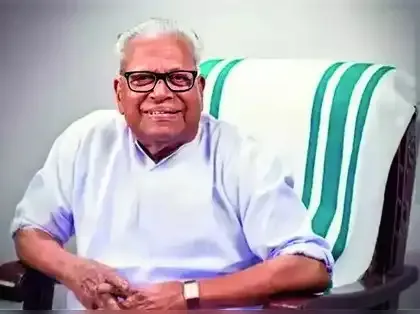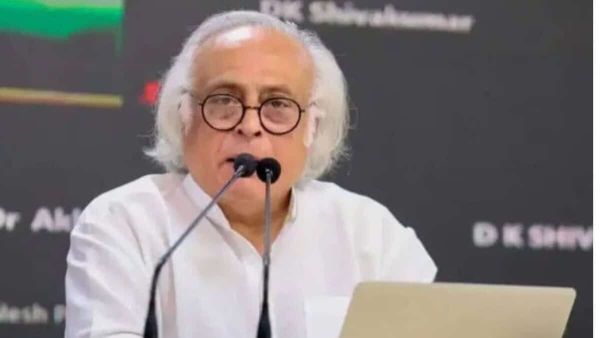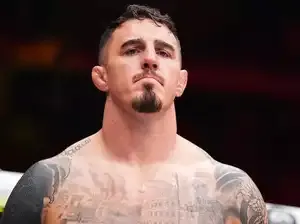Veteran communist leader and former Kerala CM V S Achuthanandan died on Monday. He was 101. VS lived 23 years longer than the average life expectancy in Kerala. Which, at 78, is the highest among all states - and nine years longer than in UP. The increase in the average lifespan of a Malayali is but one example of the social transformation the state underwent, driven by people like VS.
That a tea seller could rise as a political leader seems remarkable to many. But not in Kerala. Pinarayi Vijayan started life as a weaver. VS started off as a tailor, joined a coir factory, and became a trade union worker at the factory, commencing the political career that took him to the CM's office, and into the hearts of millions of Malayalis.
Communists of Kerala came out of Congress Socialist Party. Their leaders were ordinary people who organised mass movements, taking forward the dynamic of emancipatory change that decades of social reform, including socio-religious reform, had set in motion in the princely states of Travancore and Cochin, and, to a lesser extent, in Malabar, directly under British control. Kerala's communists were the most radical of the freedom fighters, in the forefront of championing interests of peasants and workers against landlords and their overlords, the British.
They spoke of socialism, Marx and the Soviet Union. But by organising people to break the resistance of entrenched authority, Kerala's communists effectively ushered in democratic modernity. This was in line with the official goals of Congress and other political formations. By going farther than other parties in using organised strength to secure the people's rights, the communists hegemonised the state's other parties as well - so much so that there is little to distinguish the actual political imagination of any party in Kerala from that of the communists, except, of course, in the case of BJP, and some fringe Muslim outfits.
It is true that Congress led the Opposition to the radical land reforms Bill brought by Kerala's first elected government, of communists, and the Congress government at the Centre used Article 356 to dismiss the government. But Congress was part of the coalition government that subsequently implemented provisions of the Bill.
Communists of Kerala were a force for democracy, abolishing pre-capitalist property relations in the primary form of property of the time: land. They carried forward the tradition of Kerala's social reform movements that had identified education as the key to social empowerment and universalised primary education. Adult literacy movements, a library movement that established at least one library and reading room in every village, and substantial investment in the expansion of healthcare - all these followed.
These were not all done by communists, true. But the ideas of equality and empowerment of the common man that inspired all such activity were championed most effectively by the communists. They got a disproportionate share of the credit.
Development resulted from the ordinary people's political empowerment. Adult franchise remains a formal ideal in those parts of India where a dalit can still be attacked for riding a horse, or showing other uppity challenges to traditional hierarchy. In Kerala, adult franchise universalised human dignity because all the state's political formations bought into the ideology of progress towards equality through the organised strength of the people.
Development is not what an enlightened state dishes out to grateful subjects. It's the consequence of popular empowerment.
People of Kerala adored the initial generation of communist leaders - who changed them from powerless, assetless, unlettered bits of labour at the disposal of those who owned land or factories, into citizens with entitlements, to political power and what power could do to allocate resources in a pro-people fashion.
VS, as one of Kerala's foremost communists - who had been jailed and tortured, had to go into hiding when the party was banned, led an austere lifestyle, and was incorruptible - was adored, like A K Gopalan and E M S Namboodiripad. But his active political life extended to the time of 24x7 TV, and later, into that of celebrity, promoted by social media.
During his long stints as leader of opposition, and one term as CM, VS dominated the public discourse as other leaders had not. He championed environmental causes and acted against overt misogyny.
But he shaped and reflected the limitations of Kerala's communist movement as well. Women hold up half the sky, said Mao. Labour force participation rate for Chinese women is 60%. While Kerala women are as educated as men, their presence in the workforce is low. Patriarchy governs norms of acceptable conduct.
Reform of culture and caste ossified in Kerala. Not so much despite, as because of communists. After having laid the ground for rapid capitalist growth - removing pre-capitalist restraints on deployment of labour and creating an educated workforce - opposition to capitalism stunted the economy and aborted social and cultural changes associated with growth. Only of late has pragmatism allowed the communists to promote private enterprise.
VS was decisive, and could rally public support. But limitation of his party's appreciation of the emancipatory potential of broad-based capitalist growth curtailed his legacy short of prosperity.
That a tea seller could rise as a political leader seems remarkable to many. But not in Kerala. Pinarayi Vijayan started life as a weaver. VS started off as a tailor, joined a coir factory, and became a trade union worker at the factory, commencing the political career that took him to the CM's office, and into the hearts of millions of Malayalis.
Communists of Kerala came out of Congress Socialist Party. Their leaders were ordinary people who organised mass movements, taking forward the dynamic of emancipatory change that decades of social reform, including socio-religious reform, had set in motion in the princely states of Travancore and Cochin, and, to a lesser extent, in Malabar, directly under British control. Kerala's communists were the most radical of the freedom fighters, in the forefront of championing interests of peasants and workers against landlords and their overlords, the British.
They spoke of socialism, Marx and the Soviet Union. But by organising people to break the resistance of entrenched authority, Kerala's communists effectively ushered in democratic modernity. This was in line with the official goals of Congress and other political formations. By going farther than other parties in using organised strength to secure the people's rights, the communists hegemonised the state's other parties as well - so much so that there is little to distinguish the actual political imagination of any party in Kerala from that of the communists, except, of course, in the case of BJP, and some fringe Muslim outfits.
It is true that Congress led the Opposition to the radical land reforms Bill brought by Kerala's first elected government, of communists, and the Congress government at the Centre used Article 356 to dismiss the government. But Congress was part of the coalition government that subsequently implemented provisions of the Bill.
Communists of Kerala were a force for democracy, abolishing pre-capitalist property relations in the primary form of property of the time: land. They carried forward the tradition of Kerala's social reform movements that had identified education as the key to social empowerment and universalised primary education. Adult literacy movements, a library movement that established at least one library and reading room in every village, and substantial investment in the expansion of healthcare - all these followed.
These were not all done by communists, true. But the ideas of equality and empowerment of the common man that inspired all such activity were championed most effectively by the communists. They got a disproportionate share of the credit.
Development resulted from the ordinary people's political empowerment. Adult franchise remains a formal ideal in those parts of India where a dalit can still be attacked for riding a horse, or showing other uppity challenges to traditional hierarchy. In Kerala, adult franchise universalised human dignity because all the state's political formations bought into the ideology of progress towards equality through the organised strength of the people.
Development is not what an enlightened state dishes out to grateful subjects. It's the consequence of popular empowerment.
People of Kerala adored the initial generation of communist leaders - who changed them from powerless, assetless, unlettered bits of labour at the disposal of those who owned land or factories, into citizens with entitlements, to political power and what power could do to allocate resources in a pro-people fashion.
VS, as one of Kerala's foremost communists - who had been jailed and tortured, had to go into hiding when the party was banned, led an austere lifestyle, and was incorruptible - was adored, like A K Gopalan and E M S Namboodiripad. But his active political life extended to the time of 24x7 TV, and later, into that of celebrity, promoted by social media.
During his long stints as leader of opposition, and one term as CM, VS dominated the public discourse as other leaders had not. He championed environmental causes and acted against overt misogyny.
But he shaped and reflected the limitations of Kerala's communist movement as well. Women hold up half the sky, said Mao. Labour force participation rate for Chinese women is 60%. While Kerala women are as educated as men, their presence in the workforce is low. Patriarchy governs norms of acceptable conduct.
Reform of culture and caste ossified in Kerala. Not so much despite, as because of communists. After having laid the ground for rapid capitalist growth - removing pre-capitalist restraints on deployment of labour and creating an educated workforce - opposition to capitalism stunted the economy and aborted social and cultural changes associated with growth. Only of late has pragmatism allowed the communists to promote private enterprise.
VS was decisive, and could rally public support. But limitation of his party's appreciation of the emancipatory potential of broad-based capitalist growth curtailed his legacy short of prosperity.
(Disclaimer: The opinions expressed in this column are that of the writer. The facts and opinions expressed here do not reflect the views of www.economictimes.com.)









TK Arun